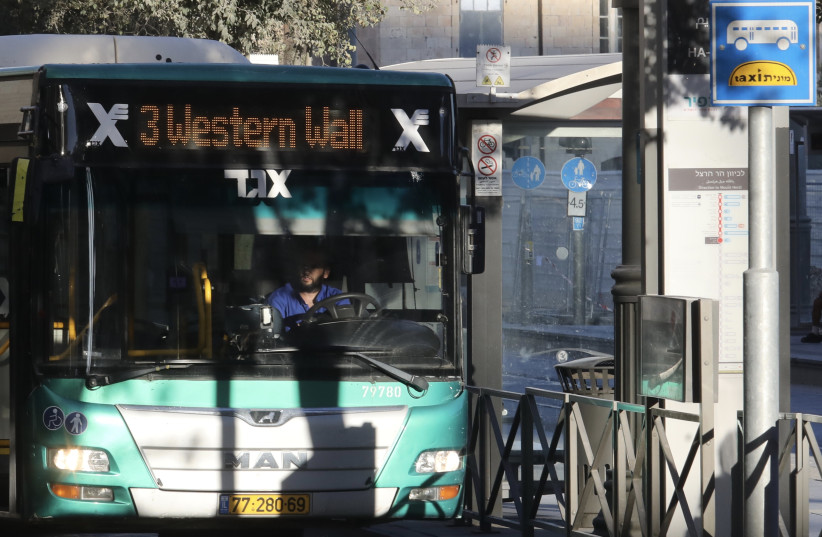During 2023, public transportation passengers were fined 238,146 times for non-payment, totaling more than NIS 24 million. Of these fines, 92% were issued to Egged passengers, which is also the largest bus company, although not by a significant margin.
The data regarding the authority and conduct of inspectors in public transportation was presented at a follow-up meeting last week by the Special Committee for Public Inquiries, chaired by MK Yitzhak Pindrus (United Torah Judaism).
Inspectors often suffer violence from passengers. However, the inspectors know that despite promises from the Transportation Ministry to expand their power of authority, they cannot demand passengers identify themselves. The ministry even intends to prohibit them from delaying a bus until the arrival of a police officer, a step that will benefit fare evaders. The fine for non-payment on a bus is NIS 100; on the light rail, it is NIS 180.
Companies enforce at the state's request to ensure revenue from trips. The state funds about 70% of public transportation costs, and passengers cover the rest through fares. The amounts paid by passengers when loading their Rav-Kavs (bus passes), through apps, or at central station counters do not go to the company's coffers but are transferred directly to the state.
How to bus companies fine people for not paying?
According to the Transportation Ministry, the companies employ 977 inspectors, each earning a monthly salary of about NIS 10,000. Of these, 862 inspectors are employed directly by the companies, while an additional 115 are funded by the government.

The director of the Public Transportation Authority, Idan Moalem, wrote to the committee stating that this is not a source of profit for the companies and that the fines imposed on passengers who do not pay actually increase costs. The companies must transfer 8% of the fines' value to the national treasury. According to him, the number of non-paying passengers has decreased on lines where enforcement has been intensified.
Non-payment affects paying passengers, making it harder for the government to track passenger movement and obtain the necessary information to decide if a route needs reinforcement by adding additional lines or creating new routes. The enforcement system costs the companies NIS 103.5 million annually, and their income after transferring part of it to the ministry amounts to NIS 16 million.
Advocate Ofer Levi from the Transportation Ministry's legal office stated in the discussion that "a large number of passengers increase the operators' income, while large fines decrease the travel experience and reduce the number of passengers. Operators do not profit from inspectors' law enforcement. We are in the process of formulating and distributing a new protocol for the distribution of fines, which is supposed to begin in early April. There is a significant difference in the authority of inspectors on buses compared to inspectors on the light rail. The authority of the light rail inspector is broader than that of their counterpart working on buses."
Gal Hershkovitz, an audit and collection consultant at Egged, said "The number of fines distributed by Egged's supervisors total up to 2.8 fines per supervisor per day. The supervisor only distributes fines to 1.5% of the passengers he inspects. Our supervisors inspect approximately 800,000 passengers per month, of which 15,000 fines are issued, and only about 200 complaints are received regarding the supervisors' conduct. If the supervisors' conduct on the buses were not appropriate, we would receive a flood of complaints. Each Egged company inspector undergoes training by an external company through a large number of simulations. The cost Egged incurs on training and funding their inspectors exceeds the revenues provided through the fines to the company."
According to Kafir's data, which is the company that operates the light rail in Jerusalem, since its start of operation in April 2021, the number of fines collected accounts for only about 43% of the cost of operating the supervision and collection system. According to data from Tevel Metro, the operator of the red line in Gush Dan, the average monthly expenditure for the supervision system is around NIS 500,000. On the other hand, the fines collected by the company stand at about NIS 75,000 alone.
Yossi Uzan, chairman of the supervisors' committee at Superbus, said in a discussion: "Our inspectors come from different sectors in Israeli society, but they do not receive adequate training and guidance. Bus inspectors are exposed to violence directed towards them while they just want to do their job faithfully. If we do not receive the proper professional funding package, we will not be able to do our job. The status of inspectors in Israel needs to be elevated. We are, first and foremost, service providers."
Nevertheless, Pindrus concluded the discussion by saying that "public transport passengers feel supervisors lack appropriate service awareness. It is necessary to seriously consider the option of supervising public transport by a third party that is not the operating company. I ask the Transportation Ministry to examine the quality of training of supervisors in various bus companies, and to unify them all. Before the ministry publishes its regulations for supervisors, do open up the records for public review."
The companies that collected the highest fines:
| Company | Number of reports | Fine amount |
| Egged | 197,599 | NIS 19,941,170 |
| Dan | 7,865 | NIS 779,705 |
| Dan Beersheba | 6,939 | NIS 693,560 |
| Kavim | 6,350 | NIS 658,020 |
| Afikim | 6,090 | NIS 619,235 |
Data: Transportation Ministry for 2023.
